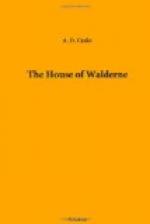Then Drogo paid a visit to the kitchen to see that the men cooks were getting forward with the banquet, that the oxen and fatlings, the spoils of a successful foray upon the farmyards of hostile neighbours—the deer, the hares, and partridges of the woods—the fish of the mere, were being successfully roasted, boiled, baked, stewed, or the like, for the king’s supper. Then he interviewed the butler about the supplies of malmsey, clary, mead, ale, and the like. Then he saw that the adornments of the great hall were completed, the banners, the armour, the antlers of the deer, suspended becomingly around the walls, the floor strewn with fresh rushes, the tapestry arranged in comely folds.
When all this was done the trumpets from the battlements announced that the royal army was descending from the heights above. It was a glorious sight that the gazer looked upon from the battlements:
On lance, and helm, and pennon fair,
That well had borne their part.
The boast of chivalry! The pomp of power! The woods fairly glistened with lances and spears reflecting the rays of the setting sun. The green of the foliage was relieved by banners of every hue, in bright contrast against the darker verdure, the tramp of war horses, the thunder of armed heels, the buzz of a myriad voices. And now the royal guard descends the gentle slope which rises just above the castle to the north, and approaches the drawbridge.
Outside they halt. Drogo kneels in front of the gateway, the keys of his castle in his hand.
The guard opens, and the king dismounts from his horse, somewhat stiffly, as if weary with riding, and receives the keys from the extended hand with a sweet smile and a few kind words.
Let us gaze on the features of that king of old; gray haired, prematurely gray; the eyebrows unlike in their curvature, giving a quaint expression to the face, a mild and good-tempered face, but somewhat deficient in character, forming the strongest contrast to that tall commanding figure on his right hand, with the stern and manly features, the greatest of the Edwards—a born king of men.
“Rise up, Sir Drogo, thou worthy knight.”
“My liege, the honour of knighthood is not yet mine own.”
“Ah, and yet so loyal!”
“For that reason, sire, not yet a knight; I was a page at Kenilworth, and was expelled for my loyalty to my king, because I could not restrain my indignation at the aspersions and misrepresentations I daily heard.”
“Ah, indeed,” said the king, “then shalt thou receive the honour from my own hands,” and he gave him a slight blow with the flat of the sword, which he then laid upon the reverently inclined head, and added, “Rise up, Sir Drogo of Walderne.”
“Methinks knighthood is too sacred to be thus hastily bestowed,” muttered Prince Edward.
“Nay, my son, we have few loyal servants in the Andredsweald, and those who honour us will we honour {32}.”




